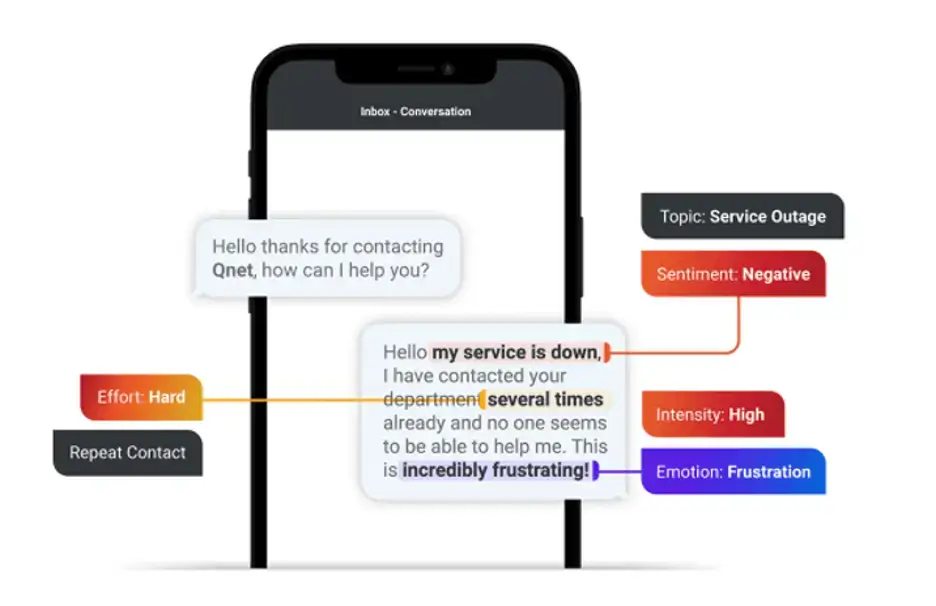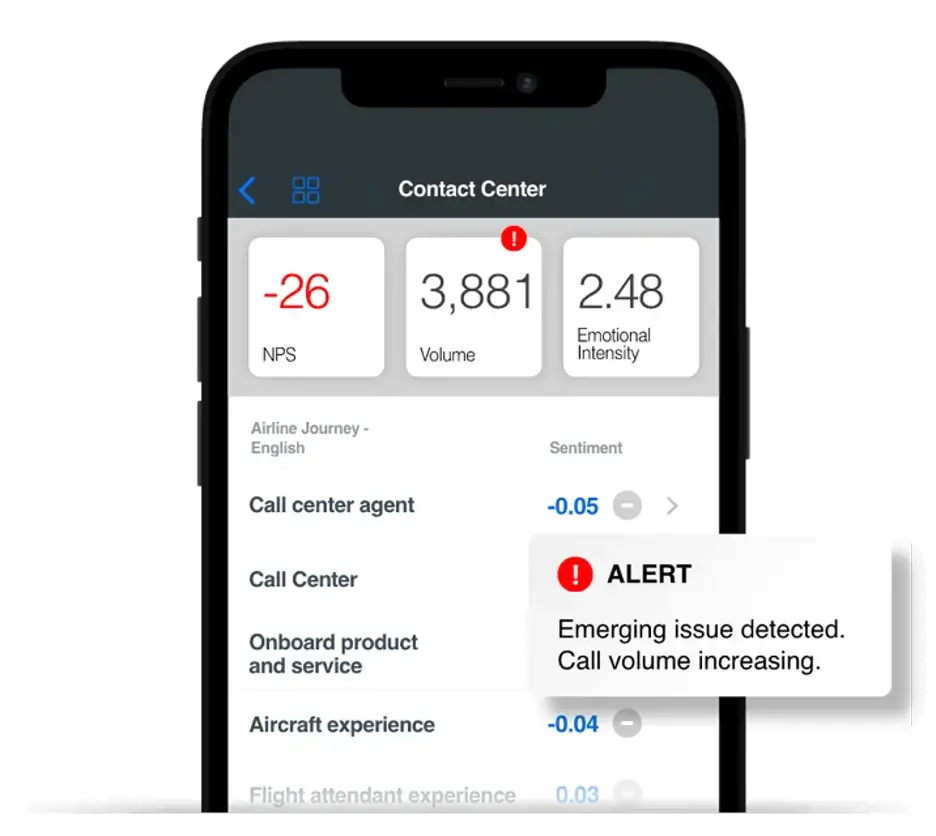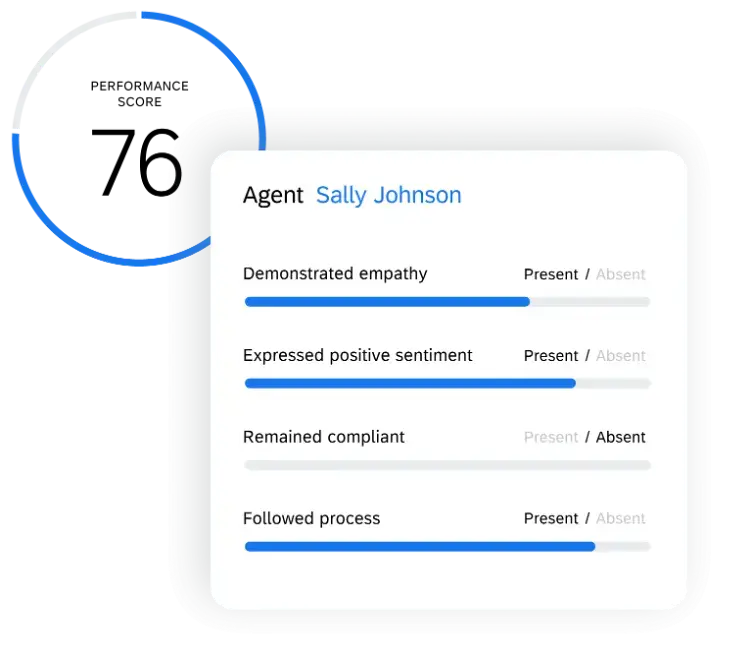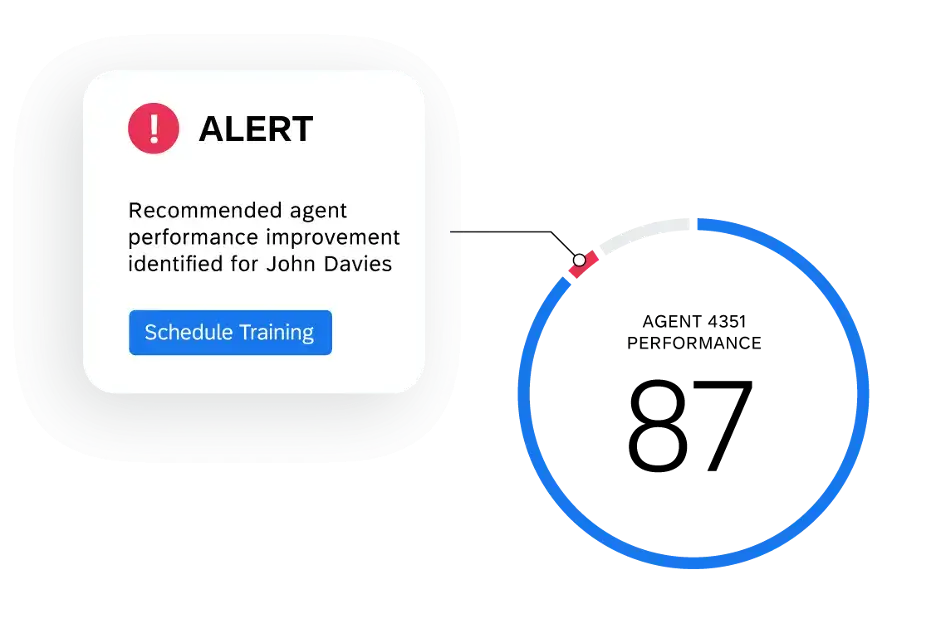What is call centre monitoring?
Call centre monitoring is the evaluation of the conversations between customers and your call centre agents. At the highest level, it helps with monitoring call quality and evaluating agent performance, but it’s also a very effective approach for identifying pain points and friction in the customer experience.
With 63% of consumers believing companies need to get better at listening to their feedback, measuring call quality by using call center monitoring methods is vital for improving customer relationships and customer satisfaction. Just over a third (36%) of consumers are dissatisfied with the empathy shown in their customer service interactions – but how do you go about monitoring the quality of your call centre interactions?
Ideally, you can use qualitative analysis to determine how your agents and call centers are performing and then transform your customer experience. However, by using call centre monitoring software with features such as speech analytics, you are able to quantitatively pinpoint the reasons why customers are contacting you, how they feel about your brand and how best to go about improving their interactions with you. It’s better than just measuring how many calls are being made and how efficient your team is, because you can provide more enticing experiences that lead to a wider range of improved business outcomes.
Read on for an understanding of what call centre monitoring tools are available and the best practices for implementing monitoring in your business.
What call centre monitoring tools can you use?
There are several methods of call monitoring that you can use to get a better idea of your call centre’s performance, your agents’ abilities, and your call quality. Artificial intelligence is transforming how this is done, too. It’s typical for an organisation to monitor 1–3% of calls and use that as a sample to assess quality, risk, and compliance. The reality is though, to actually improve the quality of interactions at scale, we need to be able to monitor and analyse every call, as they happen.
Here are some ways in which you can go about quality monitoring:
Call recording software
Being able to record all calls made to your company is invaluable for quality assurance purposes. Enable your team to filter them, search for specific interactions, and play back calls for evaluation or training, as these abilities are a vital part of call center monitoring. By recording every interaction, quality monitoring can be performed at scale with other tools, such as speech analytics.
Speech analytics
Speech analytics or conversational analytics allows you to monitor every call and understand the emotion, intent and sentiment from every customer call at scale, giving you the true voice of the customer. By monitoring in real-time, you can quickly understand trends, areas that need to be fixed, and then resolve them before the customer decides to leave or the issue spreads.

You can also better understand how your agents are performing through call monitoring with speech analytics. For example, are they friendly, knowledgeable and empathetic? What areas do they need to be coached on? Conversation analytics can help your agents to see precisely how to handle customer issues and queries and help you to develop a best practice framework for agents to follow.
By blending direct feedback from customers and this type of indirect feedback, you get the whole picture of what’s happening in your call centres.
Watch our latest video on text analytics
Automatic call scoring

With automatic call quality scoring, call center software is used to give a numerical value to the quality of the calls being made by your staff. These calls might be evaluated on their adherence to call scripts to the number of upsells made and more, depending on the company’s goals or vision of “quality”.
This process can be done manually, but with automatic scoring, you’re able to take into account 100% of calls rather than relying on a sample for a human to evaluate.
Workforce management software
Ensuring that your call centre teams have the information and the support they need to provide excellent customer experiences should form a large part of the call quality assurance process. If your team isn’t managed or supported properly, then the quality of each customer service call is likely being inhibited. Workforce management software can get insights to each agent to help them learn how they can improve, while also helping managers to find weak areas across the team and implement training.
Why is call centre monitoring important?
There are many reasons why a business should engage in contact centre quality monitoring. Not least of all is the fact that across the world, organisations risk 6.7% of their revenue ($3.1 trillion) when they lose customers due to poor experiences. Without call centre monitoring, businesses are putting their customers’ satisfaction and their own financial outcomes at risk.
Here are the main reasons why call centre monitoring is vital:
Call centre quality monitoring is vital for improving agent performance
Without in-depth analysis of all the phone calls your customers make and your agents receive, there’s no way to be sure if you are meeting and exceeding expectations for service. Call centre managers may hire brilliant agents, but understanding how they adapt to each customer situation, defuse tensions, demonstrate empathy, and turn around negative sentiment is key to maximising agent effectiveness and making sure they’re being coached in the right way, on the right things, and at the right time.
Call centre quality monitoring software can be the eyes and ears of leadership, scanning calls in real time to get the most accurate understanding of how well your agents are performing. Better yet, it can provide insights for training purposes to improve performance across the board – you can develop key performance indicators that actually reflect how you want customers to feel and act, instead of just focusing on first call resolution rates or average handle times.
This is often more important than metrics that are often seen as the most important, such as short wait times. As we have found through our own research, 6.2% of consumers say helpful agents made them happy in their contact center experience, with 5.2% saying agent empathy made a difference to their customer experience. In contrast, only 2.7% valued short wait times. By focusing on what consumers actually want (and ensuring they get it through monitoring and quality management), you’re more likely to get a positive response from your customers and reap the financial rewards.
You can improve the agent experience
How your customers feel is only one side of the coin – your agents are valuable assets to your business and the front line face (or voice) of your brand. Your agents’ experience as employees is important as well, and the quality monitoring process should improve their ability to handle queries and feel satisfied that they’re able to do their job well.
With the right call centre monitoring software, you can share insights into customer service quality in real-time, helping them to adjust and learn continuously. Receiving help when they need it is important for employees to feel supported. There’s a strong statistical link between happy employees and happy customers – so improving the agent experience is worth your time.
Read the call centre agent experience guide
Monitoring helps you increase customer satisfaction
Customers have certain expectations from contact centre experiences and from your brand, and exceeding these expectations is what keeps customers coming back. Call centre monitoring software can help you to identify customer effort, emotion, intent and sentiment, helping you to provide the right response in the present and anticipate future behaviour.
Customer feedback is a critical part of making a call centre effective. Ideally, you predict customer behavior and intercept negative interactions before they even happen. If you monitor agent activity across all calls, your call centre software can identify patterns and offer valuable predictive insights.

For example, perhaps a new product has been launched and customers are calling because they find the instructions too difficult to follow – that issue is being flagged to your contact centres, but really it’s a problem that should be resolved further upstream. By pinpointing this trend, you can develop an efficient response to handle customer queries and set other teams outside your call centre to work on creating a solution.
Investing in call centre monitoring improves your ROI
When you invest in call centre quality monitoring, you’re ensuring that your agents are being as efficient as they can be while also meeting the quality standards that your customers expect. Whether it’s from a compliance or a brand perspective, understanding what is currently happening on calls, assigning quality scores and providing agent training for improvement is important for ROI.
Even more important is the ability to be able to scan 100% of calls, not just a small sample. When your call centre performance and quality assurance is judged on a smaller percentage of the calls made, you don’t get the full picture of what’s going on and how you can improve your centre performance. A call centre can be a valuable source of improvements and not just a financial expense with the right approach, software and mindset.
It puts you ahead of the competition and increases customer loyalty
Your brand’s competitive edge is directly related to how customers feel their needs are being met. With excellent customer service, your customers know that they can come back to you again and again, with your team acting upon their feedback. Call centre quality monitoring allows you to continually tailor and consistently improve the experiences you offer.
Who performs call centre quality assurance?
Those responsible for call quality assurance can vary from contact centre to contact centre. They might be call centre managers, or be specific quality assurance specialists that monitor operations to ensure customers get a consistent, high-quality experience and that your organisation is compliant with regulations.
However, managing call quality processes efficiently can often be time-consuming and difficult. Call centre managers or quality assurance overseers may have other responsibilities or limited time to complete their quality assurance work.
This is where call centre software comes in. Rather than relying solely on human reviews of call quality, companies can utilise technology to help track the quality of customer interactions and suggest solutions when that quality falters. Quality monitoring becomes not only easier, but wider-ranging when centre software is implemented to help monitor 100% of interactions.
How to start call centre monitoring: best practices
1. Make sure you’re not just “chasing the numbers”
Brands can often suffer from the mindset that call centres and agent performance should be geared entirely towards efficiency and cost reduction, with metrics such as average handle time guiding opinions on whether a not a call is successful. However, this approach can lead to bad customer experiences and employee burnout.
While efficiency is always important, the best method provides your agents with the coaching they need to exceed expectations and provides timely and accurate solutions for your customers’ needs. If a brand focuses only on reducing call centre costs, they might be damaging morale and their customers’ faith that their issues will be fixed. Your call center quality assurance should be focused on providing great experiences that lead to good business outcomes, not just the potential financial rewards.
In a similar vein, brands shouldn’t focus on collecting everything just for the sake of it. What’s actually important to measure, and what numbers aren’t as important to track? With a tight focus on what metrics matter, this helps your agents to better meet customer expectations instead of trying to meet arbitrary goals.
2. Pinpoint what “quality” looks like
Call centre agents need specific goals to aim for when providing customer service, meaning you need to define what your version of a “quality” call looks like. Here are a few examples of metrics you might choose to use as a guide when completing call center quality assurance:
- What is your brand tone, and should your agents use the same tone on calls?
- Do your agents have a welcoming, calm approach?
- Do they use active listening and respond appropriately to customer statements?
- Are compliant standards met?
- Is there a rapport built between your agents and customers on calls?
- Do your agents use easy-to-understand language or do they use jargon?
- Do your agents ask the right questions?
- Are your wait times kept short?
- Are transfers kept to an absolute minimum?
- How fast can your agents resolve problems?
This idea of “quality” may change over time, so to ensure your contact centre agents are up to speed, give them regular training based on the insights you glean over time through your call center quality monitoring software. Scripts should be clear and updated regularly in line with your insights to ensure you’re giving your agents the best support to maximise customer satisfaction. And they should show your agents how to best exhibit the behaviours you want to see everyday – whether that’s friendliness, understanding or knowledge.

3. Monitor all phone calls in real time for maximum accuracy
Often, businesses monitor or review a sample of each agent’s calls to ensure that they’re meeting standards for customer service and customer experience. However, this isn’t always a great representation of how that agent is performing, and it makes it difficult to see the bigger picture with all agents’ call centre performance taken into account. Ideally, call centre monitoring needs to take as much data on your customer service calls as possible into account.
Using call quality monitoring software to review all phone calls means you get the most accurate understanding of what’s going on when your customers call you. Better still, if this happens in real time, agents can get extra information as they’re on the call to improve the customer experience and their performance. Is the customer frustrated, and how intense is this emotion? Is this their second call on the same subject? They can then tailor their response for better interaction. This helps agents to feel more supported and to improve at the same time.
4. Use feedback to tailor your agent coaching
Your contact centre agents can only improve when you provide them with training that’s informed by what customers are feeling and saying about their customer experience. Your employees should be able to access information on how they score on interactions and receive coaching to help them not only change individual customer interactions but to help drive business outcomes.
Help your agents understand the point of quality monitoring and give them coaching that’s based on targeted feedback, and you’ll foster employee engagement and improvement. Make sure not to just focus on what’s generally in need of improvement, but monitor those standout or atypical calls to help your quality assurance team make every call as good as the next.
Giving personalised feedback can be instrumental in providing better employee training and ensuring that all customer service interactions are at the level you expect. It can also help to reduce the number of referrals being made to senior managers, as your call agents are given helpful advice as calls progress.

Monitor and maximise call centres’ performance with Qualtrics
Continuous listening on a large scale is the most effective way of surfacing issues, improving agent experience and performance, and ultimately offering customers the best experiences possible with your call centres. Effective call quality monitoring requires evaluating 100% of your customer interactions for the highest call quality standards to be met.
With Qualtrics, you can improve customer satisfaction, develop loyalty, decrease the cost to serve, and improve agent productivity by getting insights on the deepest level possible. Your call centre monitoring and centre quality assurance become a natural part of your business practice, with insights delivered in real time to whoever needs them to improve the customer experience.
See the future of contact centre with Qualtrics